BBC Television Shakespeare From Wikipedia,
the free encyclopediaProduction website
|
Contents
1 Introduction[1]
1.1 Origins
1.2 Shakespeare on the BBC
1.3 Production
2 The 37 Plays 2.1 Season one; Cedric Messina,
producer
2.1 Seaon two; Cedric Messina, producer
2.1.1 Romeo and Juliet
2.1.2 King Richard the Second
2.1.3 As You Like It
2.1.4 Julius Caesar
2.1.5 Measure for Measure
2.1.6 The Famous History of the Life of King
Henry the Eight
2.2 Seaon two; Cedric Messina, producer
2.2.1 The First Part of King Henry the Fourth,
with the life and death of Henry surnamed
Hotspur
2.2.2 The Second Part of King Henry the
Fourth, including his death and the coronation
of King Henry the Fift
2.2.3 The Life of Henry the Fift
2.2.4 Twelfth Night
2.2.5 The Tempest
2.2.6Hamlet, Prince of Denmark
2.3 Season three; Jonathan Miller, producer
2.3.1 The Taming of the Shrew
2.3.2 The Merchant of Venice
2.3.3 All's Well That Ends Well
2.3.4 The Winter's Tale
2.3.5 Timon of Athens
2.3.6 Antony and Cleopatra[11]
2.4 Season four; Jonathan Miller,producer
2.4.1 Othello
2..4.2 Troilus and Cressida
2.4.3 A Midsummer Night's Dream>
2.5 Season Five; Jonathan Miller and
Shaun Sutton, producers
2.5.1 King ear
2.5.2 Cymbeline[11]
2.5.3 The Merry Wives of Windsor
2.5.4 The First Part of Henry the Sixt
2.5.5 The Second Part of Henry the Sixt
2.5.6 The Third Part of Henry the Sixt
2.5.7 The Tragedy of Richard III
2.6 Season six; Shaun Sutton, producer
2.6.1 Macbeth[11]
2.6.2 The Comedy of Errors
2.6.3 The Two Gentlemen of Verona
2.6.4 The Tragedy of Coriolanus[11]
2.6.5 Pericles, Prince of Tyre[11]
2.7 Season seven; Shaun Sutton, producer
2.7.1 Much Ado About
2.7.2 The Life and Death of King John
2.7.3 Love's Labour's Lost
2.7.4 Titus Andronicus[11]
3 Omissions and changes
4 Footnotes
5 External links |
|
|
The BBC Television Shakespeare was a set of television adaptations of the
plays of William Shakespeare, produced by
the BBC between 1978 and 1985.
Introduction
Origins
The concept for the series originated
in 1976 with Cedric Messina, a veteran BBC
producer, who was on-location at Glamis Castle
in Angus, Scotland shooting J.M. Barrie's
The Little Minister for the BBC Play of the
Month series. During filming, it occurred
to Messina that the castle would make a perfect
location for an adaptation of Shakespeare's
As You Like It for the series. By the time
he had returned to London, however,the concept
had grown considerably, and Messina now envisioned
an entire series devoted exclusively to the
dramatic work of Shakespeare; a series which
would adapt all thirty-seven of Shakespeare's
plays.[2]
At first, Messina envisioned the series
as having six seasons of six episodes each,
with the plan being to adapt the three Henry
VI plays into a two-part episode. This idea
was soon rejected however, as it was felt
to be an unacceptable compromise, and it
was decided to simply have one season with
seven episodes. Initially, Messina also wanted
to shoot the plays in chronological order
of how they were written, but this was rejected
because it was felt that doing so would necessitate
the series beginning with a run of relatively
little known plays.
Another early concept of Messina's which
had to be rejected was the idea of shooting
the eight sequential history plays ( Richard
II,Henry IV, Part 1,Henry IV, Part 2,Henry
V,Henry VI, Part 1,Henry VI, Part 2,Henry
VI, Part 3 and Richard III) in chronological
order of the events they depict, with linked
casting and the same director for all eight
adaptations (David Giles. During the early
planning stages for Richard II and Henry
IV, Part 1 however, the plan for linked casting
fell apart when it was discovered that although
Jon Finch (Henry Bolingbroke in Richard II)
could return as Henry IV, Jeremy Bulloch
as Henry 'Hotspur' Percy and David Swift
as the Earl of Northumberland were unable
to do so, and the parts had to be recast,
thus undermining the concept of shooting
the plays as one sequence. Ultimately,during
the first season, Richard II, although still
directed by Giles, was treated as a stand-alone
piece, whilst Henry IV, Part 1, Henry IV,
Part 2 and Henry V (all also directed by
Giles) were treated as a trilogy during the
second season, with linked casting between
them. The second four plays were then directed
by Jane Howell during the fifth season as
one unit, with linked casting and a common
set.
The BBC had screened many Shakespearean adaptations
before, but never on this scale. The first
broadcast was on the afternoon of February
5, 1937; an eleven-minute scene from As You Like It, directed by Robert Atkins with Margaretta
Scott as Rosalind and Ion Swinley as Orlando.
Later that evening, a fourteen-minute segment
from the wooing scene of Henry V was screened, directed by George More O'Ferrall
and starring Henry Oscar as Henry and Yvonne
Arnaud as Katherine.[3] O'Ferrall would oversee
numerous productions of Shakespeare over
the course of 1937[4]; a ten-minute excerpt
from Mark Antony's funeral speech in Julius
Caesar, starring Henry Oscar (February 11);
a ten-minute excerpt from Much Ado About
Nothing with Henry Oscar as Benedick and
Margaretta Scott as Beatrice (also February
11);a twenty-five minute extract from Macbeth,
with Henry Oscar as Macbeth and Margaret
Rawlings as Lady Macbeth (March 25); a thirty-minute
extract from Twelfth Night, with John Wyse
as Orsino and Greer Garson as Olivia (May
14); and a sixty seven-minute extract from
Othello starring Baliol Holloway as Othello,
D.A. Clarke-Smith as Iago and Celia Johnson
as Desdemona. O’Ferrall also produced a
1938 broadcast of a live thirty-minute extract
from an Old Vic production ofMacbeth, directed
by Michel Saint-Denis and starring Laurence
Olivier and Judith Anderson. 1938 also saw
the first full-length broadcast of a Shakespeare
play; Dallas Bower's modern dress production
of Julius Caesar at the Shakespeare Memorial Theatre starring
Ernest Milton as Caesar and D.A. Clark-Smith
as Mark Antony. These transmissions came
to an end with the onset of war in 1939 and
none of them survive now. After the war,
Shakespearean adaptations were screened less
frequently, although there were numerous
live transmissions of actual plays; for example,
a one hundred-minute abridged version of
Orson Welles legendary modern dress Mercury
Theatre production of Julius Caesar, starring
Welles himself; a twenty five-minute extract
from Stephen Thomas' Regent's Park roduction
of A Midsummer Night's Dream, starring Alexander
Knox as Oberon and Tea Holme as Titiana;
and a one hundred and forty-minute version
of Dallas Bower's production ofThe Tempest,
with Peggy Ashcroft as Miranda and John Abbott
as Prospero. In 1948, George More O'Ferrall
directed and produced a made-for-TV two-part
adaptation of Hamlet with John Byron as Hamlet,
Sebastian Shaw as Claudius, Margaret Rawlings
as Gertrude and
There were also three multi-part Shakespearean
adaptations shown during the 1950s and 1960s.
The first was The Life and Death of Sir John
Falstaff (1959). Produced and directed by
Ronald Eyre and starring Roger Livesey as
Falstaff, the series took all of the Falstaff
scenes from the Henry IV plays and The Merry Wives of Windsor and adapted them into seven half-hour episodes.
The second was An Age of Kings (1960). Produced by Peter Dews and directed
by Michael Hayes, the show comprised fifteen
one-hour episodes which adapted all eight
of Shakespeare's sequential history plays.
The third was the Peter Dews produced The
Spread of the Eagle (1963), which featured
nine one-hour episodes adapting, in chronological
order of the real life events, Criolanus,
Julius Caesar and Antony and Cleopatra. However, The Spread of the Eagle was not a huge success, and afterwards,
the BBC returned to smaller screenings with
less financial risk.[5] In 64, for example,
the John Barton adaptation of the three Henry VI plays and Richard III into a three-parter called The Wars of the Roses by the Royal Shakespeare Company was aired over a four-week period. Another
1964 production was Hamlet at Elsinore, directed by Philip Saville and produced by Peter Luke, the adaptation starred Christopher Plummer as Hamlet, Robert Shaw as Claudius, Michael Caine as Horatio and Donald Sutherland as Fortinbras. The entire play was shot
on-location in Denmark at the real Elsinore Castle. Additionally, The Play of the Month series screened several Shakespearian adaptations
over the years; Romeo and Juliet (1967), The Tempest (1968), Julius Caesar (1969), Macbeth (1970), A Midsummer Night's Dream (1971), The Merchant of Venice (1972), Love's Labour's Lost (1974) and King Lear (1975).
As such, the BBC Television Shakespeare project was the most ambitious engagement
with Shakespeare ever undertaken by either
a television or film production company. So large was the project that the BBC couldn't
finance it alone, and required an American
partner who would guarantee access to the
United States market, deemed essential for the series
to recoup its costs. Financing took over
two years to secure, with Time-Life acting as the series' largest underwriter. Later, Exxon, Metropolitan Life and Morgan Guaranty Trust also provided financing. However, because
they had invested so much in the project,
the backers were able to suggest terms.
The most important of these was that the
productions must be traditional interpretations
of the plays set in either Shakespeare's
own time (1564 to 1616) or in the historical
period of the events depicted (such as ancient
Rome for Julius Caesar, or c1400 for Richard II etc). A two and a half hour maximum running
time was also designated, but this particular
restriction was swiftly jettisoned when it
became clear that the major tragedies in
particular would have suffer severely if
truncated too heavily. The restriction regarding
conservative interpretations however was
non-negotiable. The financiers were primarily
concerned with ratings, and the restrictions worked to this end,
ensuring the plays had "maximum acceptability
to the widest possible audience."[6] Partly because of this, although later productions
under Messina's successors, Jonathan Miller and Shaun Sutton, would be more experimental, in its early
years, the series developed a reputation
for being overly conventional, and as such,later
in the series, when Miller tried to persuade
high-calibre directors such as Peter Brook, Ingmar Bergman, William Gaskill and John Dexter to direct adaptations, he was unsuccessful.[7]
All productions were shot on video, with multiple cameras, in Studio 1 at the BBC Television Centre studios, with the exception of two first
season episodes, As You Like It and Henry VIII, which were shot on location. Also worth
noting is that composerWilliam Walton, who had scored Olivier's three Shakespearean
films (Henry V, Hamlet and Richard III) came out of retirement to write the theme music for the show.
During Messina's tenure as producer (seasons
one and two), as per the financiers' restrictions,
the adaptations tended to be conservative,
but when Jonathan Miller took over at the
start of season three, he revamped things.
Messina had favoured a broadly 'realistic'
approach which worked to simplify the texts
for audiences unfamiliar with Shakespeare,
but Miller was against any kind of 'dumbing
down'. He had came from "outside the
BBC's tradition of painstaking research and
accurate historical verisimilitude. Messina's approach had treated the plays
in realistic terms as a series of events
which had once taken place somewhere and
which could be literally represented on screen.
Miller, however, saw them as products of
a creative imagination, artefacts in their
own right, to be realised in production using
the visual and conceptual materials of their
own historical period. This led to a major
reappraisal of the original production guidelines."[8] One specific modification by Miller that
was met with great delight by directors was
his tendency to encourage the adaptations
to be more adventurous than Messina had permitted,
pushing the definition of "traditional"
to the limit. For example, he adopted a visual
and design policy of sourcing sets and costumes
from great paintings of the era in which
the play was set, thus allowing directors
to stamp more of their own aesthetic credo
on the productions than they previously been
able. Miller's aesthetic policies continued
under Shaun Sutton, who took over at the
start of season six. The project was Sutton's
retirement job, after twelve years as the
head of BBC Drama, and he was under strict
orders to bring the series to a close, as
it had run over by twelve months during Miller's
reign. Sutton was successful, and the series
closed with a broadcast of Titus Andronicus roughly twelve months later than initially
projected. Ultimately, Messina's gamble in
1978 proved successful, as the series was
a financial success, having more than broken
even by 1982.[9]
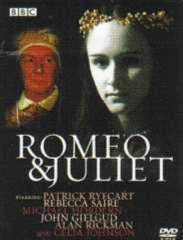 『ロメオトジュリエット』 Romeo and Juliet 『ロメオトジュリエット』 Romeo and Juliet
アルヴィン・ラコフ演出,収録 January 31-February
5, 1978、英国での初放送 December 3, 1978、アメリカでの初放送
March 14, 1979。
パトリック・ライカート Patrick Ryecart
as Romeo, レベッカ・シャイア Rebecca Shire
as Juliet, セリア・ジョンソン Celia Johnson
as the Nurse, マイケル・ホーデーン Michael
Hordern as Lord Capulet, ジョン・ギールグッド John
Gielgud as the Chorus, アンソニー・アンドリュース Anthony
Andrews as Mercutio, アラン・リックマン Alan
Rickman as Tybalt,ジョセフ・オコンナー Joseph
O'Conor as Friar Lawrence,ローレンス・ナイスミス Laurence
Naismith as Prince Escalus,ジャクリーン・ヒル Jacqueline
Hill as Lady Capulet,クリストファー・ストローリ
Christopher Strauli as Benvolio,クリストファー・ノーゼイ Christopher
Northey as Paris,ピーター・ヘンリー Peter
Henry as Peter, ロジャー・ディヴィッドソン Roger
Davidson as Balthasar, ジョン・ポール John
Paul as Montague, ズェルマ・ディーン Zulema
Dene as Lady Montague, エスモンド・ナイト Esmond
Knight as Old Capulet, デイヴィッド・シブリー David
Sibley as Samson, ジャック・カー Jack Carr
as Gregory, バニー・リード Bunny Reed as
Abraham, ヴァーノン・ドブチェフ Vernon Dobtcheff
as Apothecary, ジョン・サヴィデント John
Savident as Friar John
≪舞台裏で≫レベッカ・シャイアは映画が製作されたときわずか14歳だった。ジュリエットを演じた女優としては異常に若かった(舞台のときはたった13歳)。
『リチャード二世』 King Richard the Second
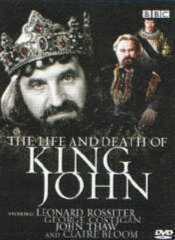
Directed by David Giles, Taping dates: April
12-17, 1978,First transmitted in the UK:
December 10, 1978. First transmitted in the
US: March 28, 1979
Derek Jacobi as Richard II, Jon Finch as
Henry Bolingbroke,John Gielgud as John of
Gaunt, Duke of Lancaster, Charles Gray as
Edmund Langley, Duke of York, Wendy Hiller
as the Duchess of York, Mary Morris as the
Duchess of Gloucester, David Swift as the
Duke of Northumberland, Clifford Rose as
the Bishop of Carlisle, Charles Keating as
Duke of Aumerle, Richard Owens as Thomas
Mowbray, Janet Maw as the Queen, Jeffrey
Holland as the Duke of Surrey, Jeremy Bulloch
as Henry 'Hotspur' Percy, Robin Sachs as
Bushy, Damien Thomas as Bagot Alan Dalton
as Green David Dodimead as Lord Ross, John
Flint as Lord Willoughby Carl Oatley as Earl
Berkeley, William Whymper as Sir Stephen
Scroop John Barcroft as Earl of Salisbury,
David Garfield as Welsh Captain, Desmond
Adams as Sir Pierce of Exton, Bruno Barnabe
as Abbot of Westminster, Jonathan Adams as
Gardener Alan Collins as Gardener's Man,
John Curless as Lord Fitzwater, Terry Wright
as Murderer
『お気にめすまま』 As You Like It
Directed by Basil Coleman, Taping dates:
May 30-June 16, 1978, First transmitted in
the UK: December 17, 1978, First transmitted
in the US:> February 28, 1979
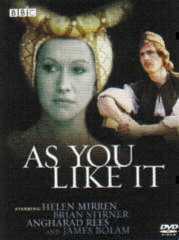
Helen Mirren as Rosalind, Brian Stirner as
Orlando, Richard Pasco as Jaques, Angharad
Rees as Celia, James Bolam as Touchstone,
Clive Francis as Oliver, Richard Easton as
Duke Frederick, Tony Church as Duke Senior,
John Quentin as Le Beau, Maynard Williams
as Silvius Victoria, Plucknett as Phebe,
Marilyn Le Conte as Audrey, Tom McDonnell
as Amiens David Lloyd Meredith as Corin,
Arthur Hewlett as Adam, Jeffrey Holland as
William, Timothy Bateson as Sir Oliver Martext,
David Prowse as Charles the Wrestler, John
Moulder-Brown as Hyman, Paul Bentall as Jacques
de Boys, Chris Sullivan as Dennis
Filmed at Glamis Castle in Scotland, this
was one of only two productions shot on location,
the other being Henry VIII. Director Basil Colemen initially felt that
the play should be filmed over the course
of a year, with the change in seasons from
winter to summer marking the ideological
change in characters, but he was forced to
shoot entirely in May, even though the play
begins in winter.
Director Herbert Wise felt that Julius Caesar should be set in the Elizabethan era, but he was compelled by the financiers
to set it in a Roman milieu. Wise felt that Shakespeare had written
the play specifically as a commentary on
Elizabethan culture, and that interpreting
it literally as being a play about Ancient Rome trivialised the story.
-
Directed by Desmond Davis
-
Taping dates: May 17-22, 1978
-
First transmitted in the UK: February 18, 1979
-
First transmitted in the US: April 11, 1979 Kenneth Colley as the Duke
Kate Nelligan as Isabella Tim Pigott-Smith
as AngeloChristopher Strauli as Claudio John McEnery
as Lucio Jacqueline Pearce as Mariana Frank
Middlemass as Pompey Alun Armstrong as Provost
Adrienne Corri as Mistress Overdone Ellis
Jones as Elbow John Clegg as Froth William
Sleigh as Barnardine Neil McCarthy as Abhorson
Yolanda Vazquez as Juliet Eileen Page as
Francesca Kevin Stoney as Escalus Godfrey
Jackman as Friar Thomas
Behind-the-scenes
Director Desmond Davis based the brothel in the play on a traditional Western saloon and the prison on a typical horror filmdungeon.
Shot at Leeds Castle, Penhurst Place and Hever Castle and in the actual rooms in which some of
the real events took place.
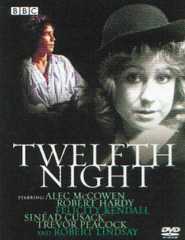 演出はジョン・ゴリー John Gorrie、収録は
May 16-21, 1979、英国初放送は January 6,
1980、アメリカ初放送は February 27, 1980。
アレック・マッコーェン Alec McCowen as
Malvolio, ロバート・ハーディRobert Hardy
as Sir Toby Belch, フェリシティ・ケンドール Felicity
Kendal as Viola,アネット・クロスビー Annette
Crosbie as Maria,サイニード・キューザック
Sine'ad Cusack as Olivia, トレヴァー・ピーコック Trevor
Peacock as Feste,クライヴ・アリンデル Clive
Arrindell as Orsino, ロニー・スティーヴンス Ronnie
Stevens as Sir Andrew Aguecheek,ロバート・リンゼー Robert
Lindsay as Fabian,モーリス・レーヴス Maurice
Roe"ves as Antonio, マイケル・トーマス Michael
Thomas as Sebastian eynolds,マルコルム・レイノルズ Malcolm
Reynolds as Valentine ライアン・ミッチェル Ryan
Michael as Curio,リック・モーガン Ric Morgan
as the Sea Captain,アーサー・ヒューレット
Arthur Hewlett as the Priest。 演出はジョン・ゴリー John Gorrie、収録は
May 16-21, 1979、英国初放送は January 6,
1980、アメリカ初放送は February 27, 1980。
アレック・マッコーェン Alec McCowen as
Malvolio, ロバート・ハーディRobert Hardy
as Sir Toby Belch, フェリシティ・ケンドール Felicity
Kendal as Viola,アネット・クロスビー Annette
Crosbie as Maria,サイニード・キューザック
Sine'ad Cusack as Olivia, トレヴァー・ピーコック Trevor
Peacock as Feste,クライヴ・アリンデル Clive
Arrindell as Orsino, ロニー・スティーヴンス Ronnie
Stevens as Sir Andrew Aguecheek,ロバート・リンゼー Robert
Lindsay as Fabian,モーリス・レーヴス Maurice
Roe"ves as Antonio, マイケル・トーマス Michael
Thomas as Sebastian eynolds,マルコルム・レイノルズ Malcolm
Reynolds as Valentine ライアン・ミッチェル Ryan
Michael as Curio,リック・モーガン Ric Morgan
as the Sea Captain,アーサー・ヒューレット
Arthur Hewlett as the Priest。
≪舞台裏で≫監督のジョン・ゴリーはこの劇をイギリスのカントリー・ハウスのコメディと解釈した。そして、ルイジ・ピランデルロの『Il Giaco delle Parti』からTVの『上階、下階』までの影響を具体化した。ゴリーはまたこの劇をイギリス市民戦争中と設定した。騎士派と円頂派の使用が祝祭と清教徒の衝突の劇化に焦点を当てると期待される.
The special effects seen in this episode
were not developed especially for use here.
They had been developed for Top of the Pops and Doctor Who.
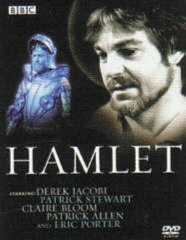 (9)BBCシェイクスピア全集の『ハムレット』 Hamlet,
Prince of Denmark (9)BBCシェイクスピア全集の『ハムレット』 Hamlet,
Prince of Denmark
演出ロドニー・ベネット、収録January 31-February
8, 1980、英国初放送 May 25, 1980、アメリカ初放送 November
10, 1980。
デレク・ジャコビ Derek Jacobi as Hamlet、クレア・ブルーム
Claire Bloom as Gertrude,パトリック・スチュワート Patrick
Stewart as Claudius、エリック・ポーター Eric
Porter as Polonius、ララ・ワード Lalla Ward
as Ophelia、ディヴィッド・ロッブ David Robb
as Laertes、 パトリック・アレン Patrick Allen
as the Ghost of Hamlet's Father,、ロバート・スワン
Robert Swann as Horatio、 ジョナサン・ハイド
Jonathan Hyde as Rosencrantz、ジオフリー・ベイトマン
Geoffrey Bateman as Guildenstern,、 エムリス・ジェイムズ Emrys
James as Player King 、ジェイソン・ケンプ
Jason Kemp as Player Queen、イアン・チャールソン
Ian Charleson as Fortinbras、テイム・ウィルトンTim
Wylton as First Gravedigger、 ピーター・ベンソンPeter
Benson as Second Gravedigger、ポール・ハムポレッツPaul
Humpoletz as Marcellus ニール・パッデンNiall
Padden as Bernardo クリストファー・ベインズChristopher
Baines as Francisco、ジョン・ハンフリー John
Humphry as Voltimand、ジョン・スターランド
John Sterland as Cornelius、ピーター・ゲイル
Peter Gale as Osric、レイモンド・メイソン
Raymond Mason as Reynaldo、 ダン・ミーデン
Dan Meaden as Norwegian Captain、ディヴィッド・ヘンリー
David Henry as English Ambassador。
The casting of John Cleese as Petruchio was
not without controversy at the time. Cleese
had never performed Shakespeare before, and
was not a fan of the first two seasons of
the BBC Television Shakespeare, and took some persuading from Miller that
the BBC Shrew would not be, as Cleese feared "about
a lot of furniture being knocked over, a
lot of wine being spilled, a lot of thighs
being slapped and a lot of unmotivated laughter."[10] As such, Miller told Cleese that the episode
would interpret Petruchio as an early Puritan,
and that the part was not to be acted along
the traditional lines of the swaggering bully
a laRichard Burton in Franco Zeffirelli's adaptation. In tandem with this interpretation, the
song sung at the end of the play is a musical
version of Psalm 128, which was often sung in Puritan households
at the end of a meal during Shakespeare's
own day.
In line with producer Jonathan Miller's new
aesthetic policy, director Elijah Moshinsky
composed many of the shots of the film as
live action replicas of the work of Johannes Vermeer.
Michael Bogdanov was originally hired to direct this episode,
but he resigned after his modern-dress interpretation
was considered too radical.
During the shooting of the scene with the
snake, the snake crawled down the back of
Jane Lapotaire's dress.
James Earl Jones was originally hired to play the role of
Othello, but Equity, the English Actor's Guild, refused to issue
a work permit. During production itself,
Jonathan Miller based the visual design on
the work of El Greco.
Director Jonathan Miller used the work of
gothic painter Lucas Cranach as a visual influence during the production,
and several of Cranach's paintings can be
seen in Ajax's tent.
Elijah Moshinsky based the fairies in the
play on the baroqueeroticism of Rembrandt and Peter Paul Rubens.
『リア王』 King Lear
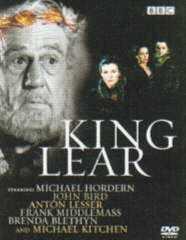 演出はジョナサン・ミラー。収録日時は1982年3月26日から4月2日、英国初放送日1982年9月19日、アメリカ初放送日1982年10月18日。 演出はジョナサン・ミラー。収録日時は1982年3月26日から4月2日、英国初放送日1982年9月19日、アメリカ初放送日1982年10月18日。
ケント伯(ジョン・シラプネル)、グロスター(ノーマン・ロッドウェイ)エドマンド(マイケル・キッチン)、リア王(マイケル・ホルデーン)、ゴネリル(ギリアン・バージ)、コーデリア(ブレンダ・ブレスリン)、リーガン(ペネロープ・ウィルトン)、アルバニー公(ジョン・バード)、コーンウォール公(ジュリアン・カリー)、バーガンディ(ディヴィッド・ウェストン)、フランス王(ハリー・ウォーターズ)、エドガー(アントン・レサー)、オズワルド(ジョン・グリロ)、道化(フランク・ミドルマス)、カラン(ケン・スコット)、医師(ジョージ・ハウ)
をスターにした。しかし、元来ロバート・ショウがリアに予定されていたが、彼は1978年に死亡してしまった。この製作が始まる前だった。
≪舞台裏で≫ジョナサン・ミラーは以前に『リア王』をBBCシリーズ「今月の演劇」用に脚色して演出した経験があった。ミラーの前回はマイケル・ホルデーン(リア王)とフランク・ミドルマス(道化)をスターにした。もとはロバート・ショウがリア王に予定されていたが、本プロダクションが始まる前の1978年に亡くなった。
Director David Jones originally wanted to
shoot the episode in Stratford-upon-Avon but was restricted to a studio setting.
Jones got around this by basing his set on
the house which belonged to Shakespeare's
son-in-law, John Hall.
This episode was filmed on the same set as
The First Part of Henry the Sixt. However, designer Oliver Bayldon altered the set so it would appear that
the paint work was flaking and peeling, and
the set falling into a state of disrepair,
as England descended into an ever increasing
state of chaos.
This episode was filmed on the same set as
The First Part of Henry the Sixt and The Second Part of Henry the Sixt. However, designer Oliver Bayldon altered
the set so it would appear to be completely
falling apart, as England descended into
an even worse state of chaos.
This episode was filmed on the same set as
the three Henry VI plays. However, designer Oliver Bayldon
altered the set so it would appear to be
a ruin, as England reached its lowest point
of chaos.
Season six; Shaun Sutton, producer Macbeth[11]
Directed by Jack Gold Taping dates: June 22-28, 1982 First transmitted in the US: October 17, 1983 First transmitted in the UK: November 5, 1983 Brenda Bruce as First WitchEileen Way as Second WitchAnne Dyson as Third WitchMark Dignam as DuncanJames Hazeldine as MalcolmJohn Rowe as Lennox Gawn Grainger as Ross
Nicol Williamson as MacbethIan Hogg as BanquoDavid Lyon as Angus Jane Lapotaire as Lady MacbethAlistair Henderson as FleanceTony Doyle as MacduffTom Bowles as DonalbainEamon Boland as Seyton Jill Baker as Lady MacduffCrispin Mair as Young MacduffMatthew Long as Menteith Peter Porteous as
Caithness William Abney as Old SiwardNicholas Coppin as Young Siward
The Comedy of Errors
Directed by James Cellan Jones, Taping
dates: November 3-9, 1983, First transmitted
in the UK: December 24, 1983, First transmitted
in the US: February 20, 1984
Cyril Cusack as Aegeon, Charles Gray as Solinus
Nicolas Chagrin as Master of the Mime Michael
Kitchen as Antipholus Roger Daltrey as Dromio
Suzanne Bertish as Adriana Joanne Pearce
as Luciana Marsha Fitzalan as Luce Sam Dastor
as Angelo David Kelly as Balthazar Geoffrey
Rose as Pinch Ingrid Pitt as Courtesan Wendy
Hiller as the Abbess
The music in this episode was created by
Anthony Rooley, who wrote new arrangements of works from
Shakespeare's own time. For example, John Dowland's piece 'Lachrimae' was rewritten and performed by Rooley.
According to director Don Taylor, the use
of the young actors dressed as cherubs was to convey the idea that the characters
lived in a 'Garden of Courtly Love', which
was slightly divorced from every day reality.
Director Elijah Moshinsky modelled the relationship
between Coriolanus and his mother after that
between Rose Kennedy and her sons.
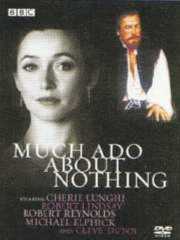 『空騒ぎ』 Much Ado About Nothgi 『空騒ぎ』 Much Ado About Nothgi
演出はスチュアート・バージ Stuart Burge。収録 August
15-21, 1984,英国での初放送 December 22,
1984,アメリカでの初放送October 30, 1984。
リー・モンターグ Lee Montague as Leonato、シェリー・ルンギ Cherie
Lunghi as Beatrice、キャサリン・レヴィ Katharine
Levy as Hero、ジョン・フィンチ Jon Finch
as Don Pedro、 ロバート・リンゼィ Robert
Lindsay as Benedick、ロバート。レイノルズ Robert
Reynolds as Claudio、ゴードン・ホワイティング Gordon
Whiting as Antonio、 ヴァーノン・ドブチェフ Vernon
Dobtcheff as Don John、ロバート・グイリム Robert
Gwilym as Conrade、トニー・ロー Tony Rohr
as Borachio、 パメラ・モイセイウィッチ Pamela
Moiseiwitsch as Margaret、イシア・ベニーソン Ishia
Bennison as Ursula、 オズ・クラーク Oz Clarke
as Balthasar、マイケル・エルフィック Michael
Elphick as Dogberry、クライヴ・ダン Clive
Dunn as Verges、 グラハム・クラウデン Graham
Crowden as Friar Franci。
≪舞台裏で≫『空騒ぎ』はドナルド・マックウィーニー演出、ペネロープ・キースとマイケル・ヨーク主演で、このシリーズの最初に製作され記録されたのだが、アメリカの視聴者に不満と考えられて、放送されなかった。第7シーズンに撮り直される間、スチュアート・バージ監督は最初はなんらセットなしで、背景の空白のタペストリーに反する完全なエピソードを撮ることを考えたが、観客がこれを良しと反応したわけではなかったように感じて、そのアイデアを捨てた。.
Director Elijah Moshinsky used the paintings
of Jean-Antoine Watteau, the music of Wolfgang Amadeus Mozart and the writing of Pierre de Marivaux as inspiration during the making of this
episode, which is the only play of the thirty-seven
to be set in the eighteenth century.
With the exception of Pericles, Prince of Tyre, all of the productions were based on the
texts of the First Folio (1623)[13], however, numerous changes were made throughout
the series.
-
The Taming of the Shrew
-
The Induction, and the interjection of Sly at the end
of Act 1, Scene 1 are absent.
-
Several lines are omitted from the conversation
between Grumio and Curtis in Act 4, Scene
1.
-
The brief conversation between Biondello
and Lucentio which opens Act 5, Scene 1 is
absent.
-
Act 5, Scene 2 ends differently to the play.
The last line spoken is Petruchio's "We
three are married, but you two are sped;"
thus omitting Petruchio's comment to Lucentio
"'Twas I won the wager, though you hit
the white, And being a winner, God give you
good night," as well as Hortensio's
line, "Now go thy ways, thou has tamed
a curst shrew," and Lucentio's closing
statement, "'Tis a wonder, by your leave,
she will be tamed so." Additionally,
Petruchio and Katherina do not leave the
banquet prior to the end of the play, but
remain, and engage in a song with all present.
-
Henry VI, Part 2
-
Lines are omitted from every scene. Some
of the more noticeable absences include,
in Act 1, Scene 1, both of Humphrey's references
to Bedford are absent, as is the reference to Suffolk's
demands that he be paid for escorting Margaret
from France, and York's allusion to Althaea and Calydon in his closing soliloquy. York's outline
of Edward III's seven sons is absent from Act 2, Scene
2, as is Salisbury's reference to Owen Glendower. Suffolk's accusation that Humphrey was
involved in necromancy with Eleanor is omitted from Act 3, Scene
1, as is Humphrey's outline of how he dealt
with criminals during his time as Lord Protector. Also absent from 3.1 is York's reference
to how he fought alongside Cade in Ireland. In Act 4, Scene 1, all references to Walter
Whitmore's name as Gualtier are absent. The
entirety of Act 4, Scene 5 (a brief scene
showing Scales and Gough on patrol at the
Tower of London) is absent. In Act 5, Scene 1, some of the
dialogue between Clifford and Warwick is
absent.
-
Some lines are also added to the play. In
Act 1, Scene 1, two lines are added to Salisbury's
vow to support York if he can prove he is
a legitimate heir to the crown; "The
reverence of mine age and the Neville's name/Is
of no little force if I command." In
Act 1, Scene 3, two lines are added to the
conversation between Margaret and Thump,
where Thump mistakes the word 'usurper' for
'usurer' and is corrected by Margaret. In
Act 2, Scene 1, the conversation between
Humphrey and Beaufort is extended, wherein
Humphrey says that Beaufort was born "in
bastardy".
-
Several lines are spoken by characters other
than who speak in the Folio text. In Act
1, Scene 3, Humphrey's line "This is
the law, and this Duke Humphrey's doom"
is given to Henry. In Act 1, Scene 4, during
the conjuration, there is no separate spirit
in the scene; all the spirit's dialogue is
spoken 'through' Magarey Jourdayne. Also,
later in that scene, it is Buckingham who
reads the prophecies, not York. In Act 4,
Scene 1, the second half of line 139 ("Pompey the Great, and Suffolk dies by pirates") is given
to the Lieutenant.
-
The character of George Plantagenet is introduced
towards the end of the play, just prior to
the Battle of St Albans, with which the play closes. In the text
however, George is not introduced until Henry VI, Part 3, Act 2, Scene 2
-
The play ends slightly differently to how
it is indicated in the text. After the battle,
the victorious House of York leave the stage, all except Salisbury, who
sadly looks around the field of battle at
the many dead bodies.
-
Henry VI, Part 3
-
Lines are omitted from every scene. Some
of the more noticeable absences include,
the opening twenty-four lines of the first
scene. Instead the play begins with Warwick
proclaiming "This is the palace of the
fearful king". Also in Act 1, Scene
1, all references to Margaret chairing a
session of parliament are absent, as are
her references to the pains of child birth,
and Henry's shameful behaviour in disinheriting
his son. Absent from Act 1, Scene 3 is Rutland's
appeal to Clifford's paternal instincts.
In Act 2, Scene 1, all references to Clarence's
entry into the conflict are absent, as he
had already been introduced as a combatant
at the end of 2 Henry VI. During the debate between the Yorkists and the Lancastrians in Act 2, Scene 2, Richard's "Northumberland,
I hold thee reverentially" is absent.
In Act 3, Scene 3, Warwick's reference to
Salisbury's death and the incident with his
niece are both absent. In Act 4, Scene 4,
the first twelve lines are absent (where
Elizabeth reports to Rivers that Edward has
been captured). In Act 5, Scene 6, Henry's
references to Dedalus and Icarus are absent.
-
Some lines are also added to the play. In
Act 1, Scene 1, four lines are added at the
beginning of Henry's declaration that he
would rather see civil war than yield the
throne; "Ah Plantagenet, why seekest thou to depose me?/Are we not
both Plantagenets by birth?/And from two
brothers lineally descent?/Suppose by right
and equity thou be king...". Also in
Act 1, Scene 1, a line is inserted when York
asks Henry if he agrees to the truce and
Henry replies "Convey the soldiers hence,
and then I will." Most significant is
in Act 5, Scene 1, where the incident involving
Clarence's return to the Lancastrian side
is completely different to the text found
in the Folio, and is taken entirely from
the octavo text of The True Tragedy of Richard Duke of York (1595).
-
Several lines are spoken by characters other
than who speak in the Folio text, particularly
in relation to Clarence. For example, in
Act 2, Scene 1, it is Clarence who says Edward's
"I wonder how our princely father scaped,/Or
whether he be scaped away or no/From Clifford
and Northumberland's pursuit". Clarence
also speaks Richard's "Three glorious
suns, each one a perfect sun,/Not separated
with the racking clouds/But severed in a
pale clear-shining sky" Edward's "Sweet
Duke of York, our prop to lean upon/Now thou
art gone, we have no staff, no stay"
and Richard's "Great lord of Warwick,
if we should recount/Our baleful news, and
at each word's deliverance/Stab poniards
in our flesh till all were told,/The words
would add more anguish than the wounds".
-
The presentation of the character of Montague
also differs from the Folio text. Montague
is not present in Act 1, Scene 1, and as
such, his lines are either spoken by Clarence
or omitted. He is introduced in Act 1, Scene
2, but with some notable changes to the text;
when York is giving his men instructions,
his order to Montague, "Brother, thou
shalt to London presently" (l.36) is
changed to "Cousin, thou shalt to London
presently", York's reiteration of the
order "My brother Montague shall post
to London" (l.54) is changed to "Hast
you to London my cousin Montague", and
Montague's "Brother, I go, I'll win
them, fear it not" (l.60) is changed
to "Cousin, I go, I'll win them, fear
it not." Additionally, the report of
the death of Warwick and Montague's brother
Thomas Neville in Act 2, Scene 3 is different
from the text; 'son' in line 15 is replaced
with 'father', 'brother' in line 19 is replaced
with 'son', and 'gentleman' in line 23 is
replaced with 'Salisbury'.
Footnotes
Unless otherwise stated, all background information
in this section and all behind-the-scenes
information in the next is taken from Martin
Wiggins, The (BBC DVD) Shakespeare Collection:
Viewing Notes (booklet included with the
DVD box-set) At the time, Shakespeare's complete
canon was considered to be thirty-seven plays;
seventeen comedies, ten tragedies, and ten
histories. These comprised the thirty-six
plays from the First Folio of 1623, plus
Pericles, Prince of Tyre (which had been
added to the Third Folio in 1664). As The
Two Noble Kinsmen was considered to be primarily
the work of John Fletcher and Shakespeare's
authorship of Edward III was still in doubt,
these two plays were not included in the
series. Kenneth S. Rothwell, 'The Television
Revolution' (2002) All information taken
from the British Universities Film &
Video Council "Michael Brooke, Screenonline:
The Spread of the Eagle'Susan Willis,The
BBC Shakespeare Plays: Making the Televised
Canon, (Chapel Hill & London: The University
of North Carolina Press, 1991), 10-11^Michael
Brooke, Screenonline: The BBC Television
Shakespeare^ Martin Wiggins, The (BBC DVD)
Shakespeare Collection: Viewing Notes (booklet
included with the DVD box-set), 6^Michael
Brooke, Screenonline: Shakespeare on Television"Michael
Brooke, Screenonline: The Taming of the Shrew^abcdefg
The first transmission date in the United
States is earlier than that in the United
Kingdom. See here for details Pericles was
not included in the First Folio, and wasn't
published under Shakespeare's name until
the Third Folio in 1664
External links
Screenonline: The BBC Television
Shakespeare,
by Michael Brooke'The Television
Revolution';
Chapter 4 of Shakespeare on Screen:
A Chronicle
History by Kenneth S. Rothwell; taken
from
the book Shakespeare on Screen: An
International
Filmography and Videography by Rothwell
and
Annabelle Henkin Melzer (New York:
Neal-Schuman,
1990)
|